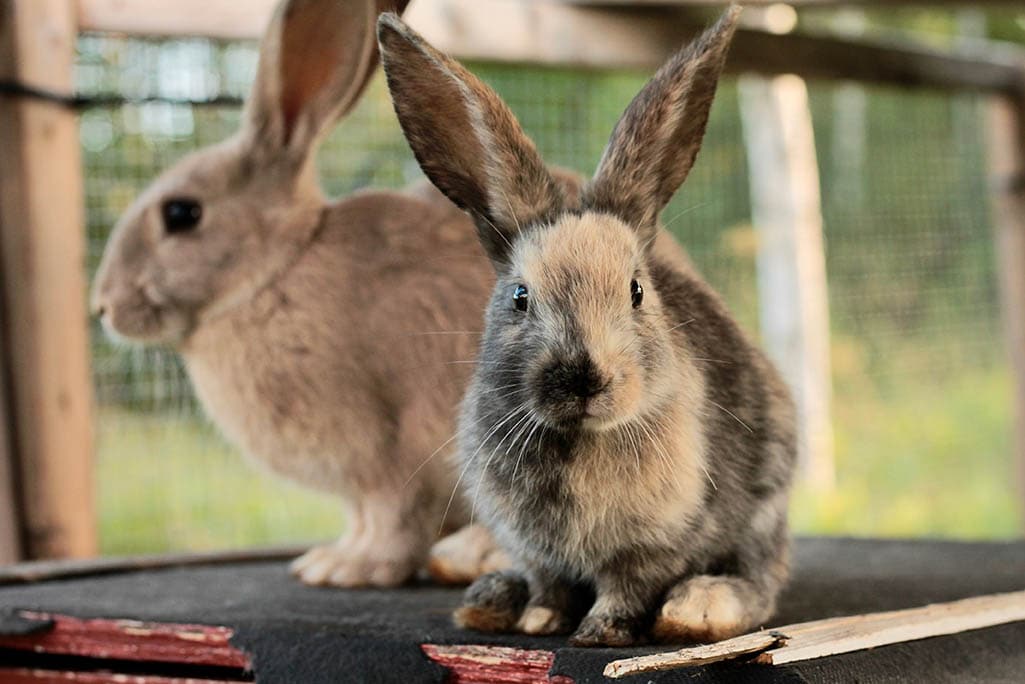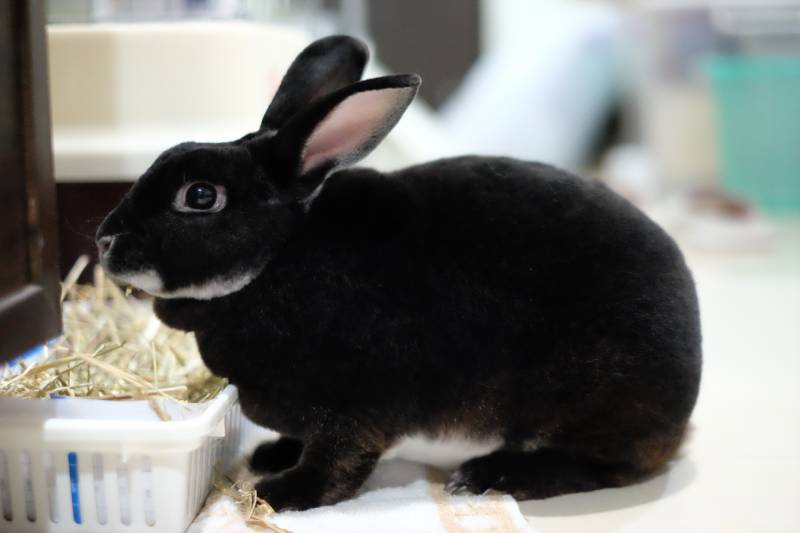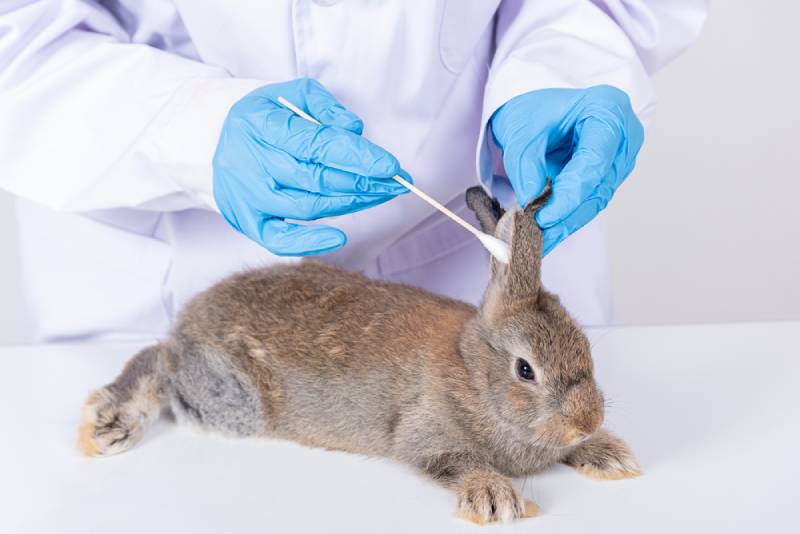Buying rabbit food isn’t as simple as picking up a basic bag of mix and feeding. They need a combination of hay and pellets, while young rabbits can benefit from a food that is designed specifically for their dietary needs. There are also options for those with special dietary needs, leading to a huge range of different rabbit foods from a variety of manufacturers.
To help you find the food that best meets your rabbit’s requirements, we have included reviews of 10 of the best rabbit foods in the UK, including hay and pellets, junior and adult food, and at a selection of prices.
A Glance at Our Winners in 2024
| Image | Product | Details | ||
|---|---|---|---|---|
| Best Overall |

|
Excel Burgess Nuggets |
|
Check Price |
| Best Value |

|
Heygates Rabbit Choice Pellets |
|
Check Price |
| Premium Choice |

|
Oxbow Essentials Adult Rabbit |
|
Check Price |

|
Burgess Excel Junior |
|
Check Price | |

|
Small Pet Select 2nd Cutting |
|
Check Price |
The 10 Best Rabbit Foods in the UK
1. Excel Burgess Nuggets With Mint Adult Food – Best Overall
| Food type: | Dry nuggets |
| Life stage: | Adult |
| Fibre: | 39% |
| Protein: | 13% |
| Fat: | 4% |
Excel Burgess Nuggets With Mint Adult Rabbit Food is a grass pellet-based food that is fortified with vitamins and minerals and with added mint for extra appeal.
Rabbits can be picky about their food, and especially over the different components in a muesli mix. They will eat the foods they like and leave those that they don’t. Not only does this mean that a portion of every bag you buy goes to waste, but it also means that your rabbit could be missing out on essential vitamins and minerals that it needs to be healthy. A pellet combines all the food and other ingredients to create individual, uniform pieces of food, with every pellet having the same ingredients: no leftovers and no need to find other ways to supplement the diet.
Burgess Excel is reasonably priced, contains high levels of natural fibre (39%), and also has natural antioxidants and prebiotics to make sure your rabbit is getting everything it needs. It also has acceptable fat and protein levels of 4% and 13%, respectively.
The only real complaint with Burgess’s Nuggets is that they are quite small, although this might benefit some rabbits, and they are quite rich, which could cause an upset stomach in some rabbits.
2. Heygates Rabbit Choice Pellets – Best Value
| Food type: | Dry pellets |
| Life stage: | All life stages |
| Fibre: | 16% |
| Protein: | 17% |
| Fat: | 4% |
Heygates Rabbit Choice Pellets are 3mm pellets that are not only suitable for adult rabbits but also for kittens and nursing mums. It can also be fed to guinea pigs and other small animals. Heygates Rabbit Choice Pellets are very inexpensive, although it does mean buying a 20kg bag: if you have a single rabbit and you feed it 50 grams of food a day, a 20kg bag will last you more than a year.
In terms of nutritional requirements, the food has 17% protein, which is slightly higher than recommended for pet rabbits, but this shouldn’t cause any problems for a healthy rabbit and makes it suitable for nursing mums. It also contains 16% fibre, which could be a little bit higher to reach recommended levels. 4% fat means that there is no added fat, and is considered a healthy amount.
Heygates Rabbit Choice Pellets are cheap and have a good fat level. They are enriched with vitamins and minerals, too, but there is a lot of food in the bag, and because Heygates has tried to accommodate all life stages and even other small pets, the fibre and protein levels could both be better for adult rabbits. Overall, though, they represent one of the best rabbit foods in the UK for the money.
3. Oxbow Essentials Adult Rabbit Food – Premium Choice
| Food type: | Dry pellets |
| Life stage: | Adult |
| Fibre: | 25% |
| Protein: | 14% |
| Fat: | 2% |
Oxbow Essentials Adult Rabbit Food is an expensive food, but it does use Timothy grass meal as its main ingredient. You will still need to feed hay as your rabbit’s primary source of food, but the inclusion of Timothy hay in the food gives these pellets 25% fibre and 14% protein, both of which are considered ideal for adult pet rabbits. It also has 2% fat, which is lower than a lot of other commercial rabbit foods and is also considered a good level.
It is a soft pellet, which means they have an appealing texture that your rabbit should find satisfying, and because the pellet combines all the ingredients it prevents selective eating from your rabbit. The inclusion of antioxidants and prebiotics helps ensure good gut health and maintain good digestive health, which is especially important in pet rabbits. Because hay is the primary ingredient, picky rabbits may turn their nose up at it, preferring other flavours instead.
4. Burgess Excel Junior and Dwarf Rabbit Nuggets With Mint
| Food type: | Dry nuggets |
| Life stage: | Junior |
| Fibre: | 17% |
| Protein: | 16% |
| Fat: | 4% |
Burgess Excel Junior and Dwarf Rabbit Nuggets With Mint are designed for young and small rabbits. Small and young rabbits need more protein and carbohydrates, which they use to provide energy, because of a faster metabolism. Extra protein also helps develop healthy muscles, ensuring good development in young kits. The 16% protein in Burgess Excel is at the top end of ideal, so is suitable for juniors. It is also 17% fibre, which is lower than some but suitable for smaller appetites.
The food’s main ingredient is grass meal, and it includes mint, which most rabbits love the smell and flavour of and therefore makes it a more appealing pellet. It also includes prebiotics, which are important for all rabbits but especially for young and more sensitive digestive systems.
The food is more expensive than Burgess’s adult food and is a little expensive, but it is nutritionally suitable for young rabbits and small breeds, contains good quality ingredients, and is popular with rabbits.
5. Small Pet Select 2nd Cutting Perfect Blend Timothy Hay
| Food type: | Timothy hay |
| Life stage: | Adult |
| Fibre: | Unavailable |
| Protein: | Unavailable |
| Fat: | Unavailable |
With hay making up approximately 90% of a pet rabbit’s diet, it is important that you choose a good-quality hay. Grass hay is preferred because it is high in fibre, so will help maintain a healthy digestive system. While alfalfa is a good choice for junior rabbits up to about the age of six months, Timothy hay is ideal for adult rabbits. Small Pet Select 2nd Cutting Perfect Blend Timothy Hay includes stems, leaves, and the heads of the seeds, and because it is the second cutting of the hay, it has greener and larger leaves that are more highly packed with protein, so it is tastier and healthier for your little ones.
Because it’s hay, and fresh hay degrades quickly, you will need to buy this product regularly, so it is important that you find good quality hay that your rabbits enjoy.
6. Kaytee Timothy Hay
| Food type: | Hay |
| Life stage: | Adult |
| Fibre: | 32% |
| Protein: | 6% |
| Fat: | 1% |
Kaytee Timothy Hay is a small bale of Timothy hay that includes both first and second cuttings. It is more expensive than the Small Pet Select second cutting, which only includes the higher quality second cutting, and the Kaytee hay is not as fresh. It also only comes in a small package. You do need to ensure that the hay is relatively fresh when fed; otherwise, it loses its nutritional value and its appeal to your rabbits, but because this will make up the bulk of your rabbit’s food if you have more than one rabbit, a single bag won’t even last a week.
With that said, it is convenient, and Timothy hay is a high-fibre hay that helps maintain a healthy gut. It can also be fed to other small animals, although that will mean that the pack disappears even sooner. It’s popular with most rabbits; a subscription will ensure that you always have enough of it to feed your rabbits, and it does provide your rabbit with its daily fibre requirements.
7. Excel Burgess Indoor Rabbit Nuggets
| Food type: | Nuggets |
| Life stage: | Adult |
| Fibre: | 20% |
| Protein: | 14% |
| Fat: | 4% |
Indoor rabbits have different requirements from outdoor rabbits. In particular, they tend to have less room to exercise and run around. Indoor rabbits are not exposed to sunlight on a regular basis, either, which means that they will need to get vitamin D from a different source: typically, their food. Excel Burgess Indoor Rabbit Nuggets are formulated for the needs of indoor rabbits.
It has 20% fibre, 14% protein, and 4% fat, all of which fall well within the recommended levels for pet rabbits. It is also a pellet, with every pellet delivering the same ingredients and preventing picky eating. The inclusion of nettle and dandelions, which rabbits would naturally forage on in the wild, makes it more appealing and ensures that your little one is getting the trace minerals it needs.
The bag is a decent size that should last a single rabbit for several months without being excessively large, but it is expensive compared to a lot of other adult rabbit foods. The indoor rabbit nuggets do not have a strong smell, which will benefit you rather than your rabbit, but they are expensive for a nugget or pellet-style food.
8. Supreme Science Selective Adult Rabbit Food
| Food type: | Pellets |
| Life stage: | Adult |
| Fibre: | 25% |
| Protein: | 14% |
| Fat: | 4% |
Supreme Science Selective Adult Rabbit Food is slightly pricey pellet-based food, but it is high in fibre (25%) and has good protein (14%) and fat (4%) levels. If your vet has recommended that your rabbit be put on a high-fibre diet, this is a good choice. Alternatively, if your rabbit suffers from constipation, a high-fibre food like this can help, and because fibre makes your rabbit feel fuller for longer, without necessarily adding more calories to their diet, it can help manage weight.
However, the food is expensive, and some ingredients, like wheat and soybean, are not considered natural additions to a rabbit’s diet. Also, the primary ingredient is alfalfa hay: alfalfa hay is typically advised for young rabbits and may give adult rabbits an upset stomach.
If you do intend to change your rabbit over to Supreme Science, introduce the new gradually over a couple of weeks. This will help their stomach and digestive system get used to it and should prevent them from getting the runs.
9. Allen & Page Breeder & Grower Pellets for Rabbits
| Food type: | Dry pellets |
| Life stage: | All life stages |
| Fibre: | 23% |
| Protein: | 12% |
| Fat: | 5% |
Allen & Page Breeder & Grower Pellets for Rabbits are designed for breeders that have a lot of rabbits, usually at various stages of life. Therefore, the pellets come in a large bag, are inexpensive, and can be fed to rabbits from weaning right through to their senior years.
They are relatively high in fibre (23%) and put at the lower end of the scale for protein (12%). They also have a fat content of 5%, which is higher than most other rabbit foods. This is another pellet food that utilizes alfalfa hay as its main ingredient. This does help make it suitable for all life stages, but it also means that adult rabbits might be better suited to a different food formula.
The size of the bag and relatively short expiration dates mean that these really are only suitable for use by breeders; the use of alfalfa hay is also indicative of this.
10. Oxbow Alfalfa Hay
| Food type: | Alfalfa hay |
| Life stage: | All life stages |
| Fibre: | 32% |
| Protein: | 16% |
| Fat: | 1.5% |
Alfalfa hay is generally recommended for junior rabbits because it is higher in calcium and protein than grass hay, and both are important for a young rabbit’s development. It can prove too rich for adults, which means it can lead to upset stomachs and other gastrointestinal complaints. Oxbow Alfalfa Hay is sold as suitable for all life stages, but unless you need to feed more calcium or protein, you should consider a Timothy or other grass hay.
Oxbow Alfalfa hay is expensive, and despite the cost, the quality of the hay can be hit and miss. There tends to be quite a lot of dust, which is not ideal for a young rabbit, and the stalks themselves are only short, which will not satisfy adult rabbits.
Buyer’s Guide: Choosing the Best Rabbit Food
A rabbit diet is quite complex. While you can provide a cat or dog with all of its nutritional requirements from a single source, this isn’t possible with rabbits. They need a variety of food types, not only ensuring that they get the right amount of protein and fibre in their diet but also ensuring that they get all essential vitamins and minerals. A rabbit’s diet can also affect things like dental health, weight, and digestive health.
To help ensure that your rabbit has the healthiest diet possible, we have put together a guide on rabbit requirements and choosing the best food to meet them.
Rabbit Diet
In the wild, rabbits forage on grass, leaves, shoots, and whatever vegetation and crops are available to them. When keeping pet rabbits, we need to try and emulate this diet.
A good hay should make up around 85% of a pet rabbit’s diet, with 5%–10% vegetables and 5%-10% pellets.
This combination provides a high-fibre diet that rabbits require. By ensuring you feed good green vegetables and a good-quality pellet, you can also meet all nutritional requirements while providing a variety of food that won’t become boring. It will also ensure that your little one grinds its teeth down to a manageable and healthy level.

Nutritional Requirements
When formulating a diet plan for your rabbit, you should aim to provide the following nutritional ratios:
These are general guidelines that are suitable for a healthy adult rabbit. Young and senior rabbits have different requirements, and so too do indoor rabbits compared to outdoor. Always listen to your veterinarian’s advice regarding special dietary requirements.
Related Read: Are Rabbits Herbivores? What You Need to Know!
Rabbit Food Types
You need to feed your rabbit a good variety of food, which can take various forms.
 Selective Feeding
Selective Feeding
Junior vs Adult Rabbit Requirements
Junior rabbits need a little more protein and calcium in their diet, and as long as the food you offer meets these requirements, you can feed junior or adult food. However, junior food is usually formulated with higher protein levels and fortified with additional calcium. Pellets may also be a little smaller and easier to chew. Dwarf rabbits have a similar dietary requirement to young junior rabbits.
Changing Food
When changing any food, but especially pellets, you should make the change gradually. Quickly swapping from one food to another can cause diarrhoea or other intestinal complaints. Start by mixing one-quarter of the new food and three-quarters of the old food. Every few days, increase this amount until, after two weeks, you are feeding just the new food. If, at any point, your rabbit does get diarrhoea, hold off on increasing the ratio until their stomach settles down.
Do Rabbits Need Constant Food?
Rabbits need a constant supply of food; specifically, they need access to suitable grass or hay. These foods are high in fibre, which will keep your rabbit’s bowel movements moving and prevent constipation. The constant gnawing of hay also helps to grind down teeth and keep them a healthy size.

Can You Overfeed a Rabbit?
Because rabbits need regular access to hay, it can seem like they are eating too much, and it is tempting to stop them from eating more or cutting down on their pellets and vegetables. Always ensure that you are feeding the right amount and weigh pellets and veggies out carefully to ensure you continue to meet the right ratio. Hay is high in fibre, and it is unlikely that your rabbit is eating too much of it. In fact, it is a positive sign if it is constantly chewing on good hay.
What Veggies Can Rabbits Eat?
Dark leafy greens are a staple of a pet rabbit’s diet. This includes vegetables like:
Try to vary what you feed and avoid only feeding a single source of vegetables. This will help keep your rabbit’s interest and prevent him from getting bored with the food you’re offering.
Is Meadow or Timothy Hay Better for Rabbits?
Timothy hay is dried Timothy grass. It is considered suitable for all rabbits, and it offers them the nutritional values that they require. Meadow hay is a more generic hay that might include some Timothy grass but will usually consist of several different types of grass. As such, it is difficult to know the exact protein and fibre content. Feeding meadow hay means that you might not be providing the diet that your rabbit requires. Most commercially available hay is Timothy hay, and if the type of hay is unspecified, it is likely to be meadow grass hay.
 Conclusion
Conclusion
Rabbits have very specific dietary requirements, and if these aren’t met, it can affect their digestive health, overall health, and even their dental health. Although most of their diet is made up of hay, which can seem dull to humans, you will need to feed fresh vegetables and some form of pellet food to ensure that they get all the essential vitamins and minerals they need.
Because there are a lot of commercial rabbit foods and hays available, we have included reviews of ten of the best rabbit foods in the UK to help you find the best. Burgess Excel Nuggets With Mint are appealing and palatable, pelleted food that prevents selective eating, is reasonably priced, and meets your rabbit’s daily requirements. If you’re looking to spend a bit less, Heygates Rabbits Choice Pellets are also nutritionally beneficial and do cost a little less, although it does require buying quite a large bag.
See also:
- Flemish Giant Rabbits for Sale in Canada: Breeders List
- 14 Rabbit Myths And Misconceptions You Need To Stop Believing Now!
- How to Get Rabbit Pee Out of a Mattress: 4 Ideas and Tips
Featured Image Credit: Chawannuch_Njoy, Shutterstock






















